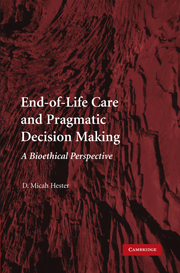2 - Blindness, Narrative, and Meaning
Moral Living
Published online by Cambridge University Press: 05 June 2012
Summary
[P]atients order their experience of illness – what it means to them and to significant others – as personal narratives.…To fully appreciate the sick person's and the family's experience, the clinician must first piece together the illness narrative as it emerges from the patient's and the family's complaints and explanatory models…
Arthur Kleinman[N]one of us get [sic.] to write the final chapters of our lives as if we had nothing whatsoever to do with other people. Put more positively, most of us want to write that final chapter in a way that preserves the “best” values that have guided our lives up to that point.
Howard BrodyChapter 1 sets forth the idea that dying is constitutively part of living, and living part of dying. Furthermore, it noted that not only is there a vast continuum of dying processes, but that in some cases, a dying process can be meaningfully controlled. The purpose, of this chapter is to spell out more thoroughly the philosophical and ethical positions that ground the arguments concerning care for the dying in the rest of the book. I begin with an elaboration on the details and meaning of “radical empiricism.” I then take up William James's prophetic warning that each of us is blind to others' interests and values. However, the radically empirical attitude demands that we overcome the blindness.
- Type
- Chapter
- Information
- End-of-Life Care and Pragmatic Decision MakingA Bioethical Perspective, pp. 13 - 40Publisher: Cambridge University PressPrint publication year: 2009



